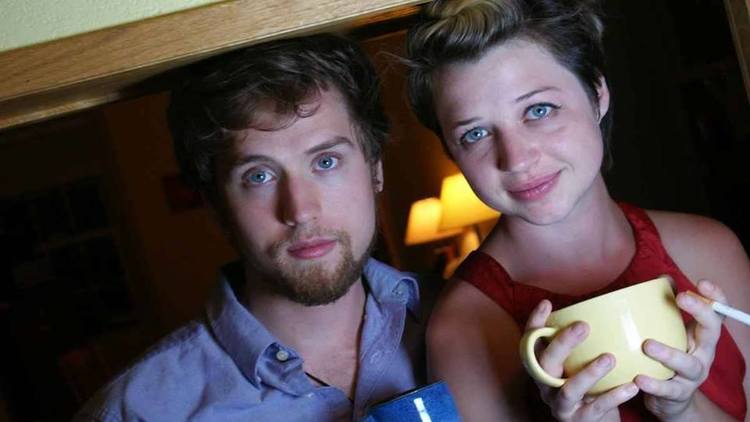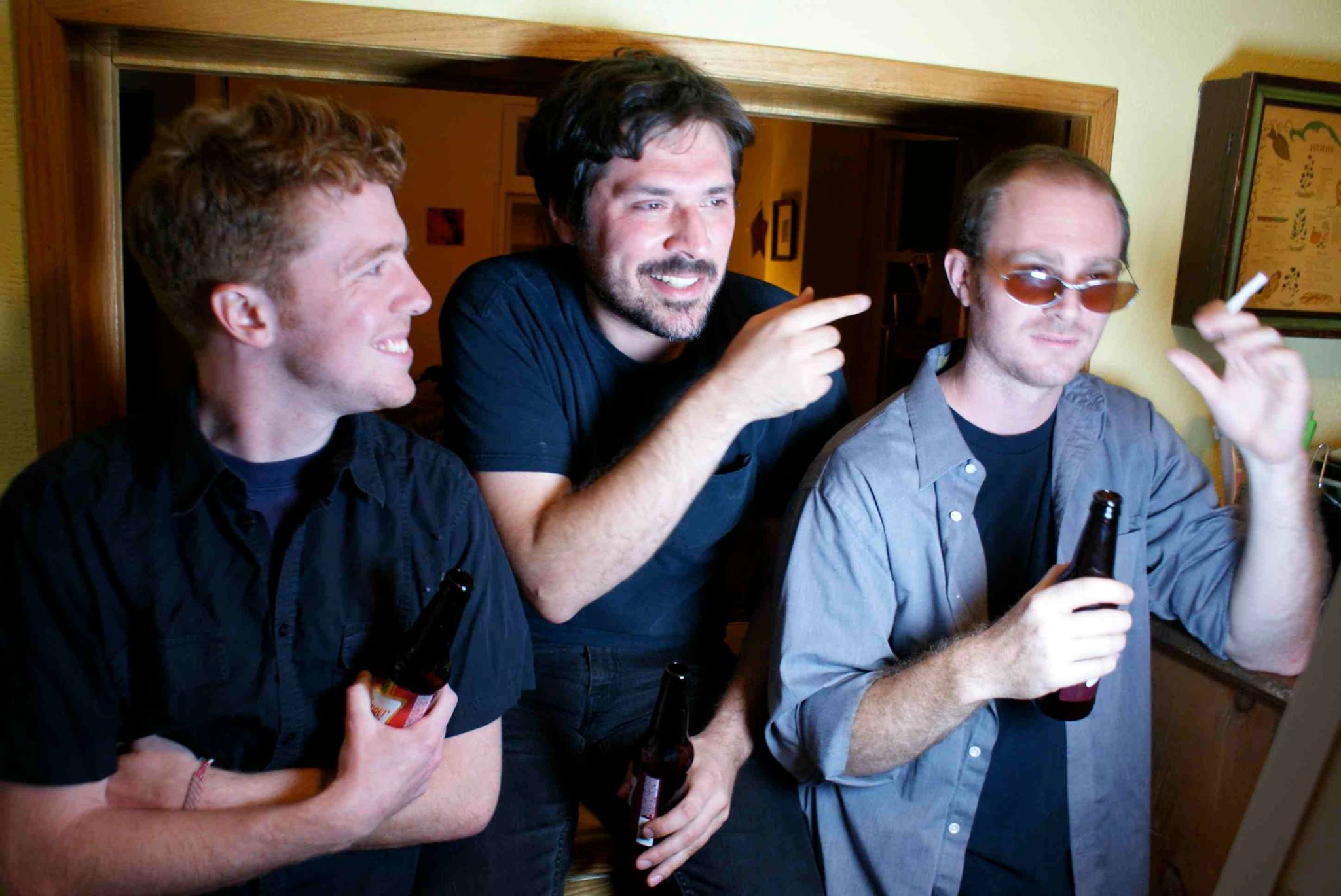An updated adaptation of Truman Capote’s classic novella Breakfast at Tiffany’s, HOLLY’S DEAD SOLDIERS was a stand-out of the 2013 Philadelphia Fringe Festival. Staged in rowhouses in South Philadelphia and Northwest Philadelphia, the intimate play (with breakfast) is a collaboration between three of Philadelphia’s best playwrights: Chris Davis, Bruce Walsh, and Douglas Williams.
Since the original production, Bruce has moved to Indiana to complete an MFA in playwrighting and teach writing, Chris has had successful runs at the Edinburgh Fringe and festivals around the country, and Doug has cofounded Orbiter 3 playwrights collective and seen his first full-length professional production (Moon Cave by Azuka Theatre). The trio decided to revisit a locus of their success with a restaging of HOLLY’S DEAD SOLDIERS featuring the original cast, opening today and running through May 1. Over the last week or so, Phindie and the three collaborators have chatted about this must-see relaunch. [2118 Reed Street] April 22-May 1, 2016; hollysdeadsoldiers.brownpapertickets.com

Phindie: Why did you guys decide to restage HOLLY’S DEAD SOLDIERS?
Doug Williams: Well why I was interested in restaging it, initially was because I still get asked about the play a lot. Even during Fringe when we were producing it people seemed really excited by the concept and by the people involved.It was one of the first things I had ever been a part of producing and I loved the atmosphere and the attitude, both of the play and of the environment that sort of surrounds the play. I love inviting people into your home and having them sit in your space, share food and drink and a show. It’s just warm and communal and a really intimate way to meet a story with a group of people.
Chris Davis: My main motivation was that it is a great story that I would like to share with more people. There are hundreds of Philadelphia productions I wish could be put on again but due to many reasons they cannot. But with house shows and this model it is viable to put on shows again and to entertain new audiences. We also have the original cast available [Kristen Bailey, Andrew Carroll, and Chris Davis], which for me, was the most important part.
Doug: After moving forward since we last did Holly’s and producing theater in bigger spaces with bigger budgets for Orbiter 3, when Chris came up with the idea of revisiting this play it just sounded like a beautiful way to spend these first days of Spring.
Phindie: In retrospect, where does this show fit into your playwriting careers?
Bruce Walsh: HOLLY’S is perhaps my favorite playwriting experience in Philly. That and the first The Guided Tour in 2004. I think it has a model that should be replicated. I love the simplicity of slicing an iconic tale into three parts and asking three writers to be responsible for each part.
Chris: It introduced me to three rules which I’ve used in three different adaptations, including last year’s Damned Dirty Apes! 1. Update the time to now, 2016 Philadelphia. 2. No words from the book. 3. Condense the story into 60 minutes. I think it’s a formula that can work with any classic book and one I look forward to using more in the future.
Bruce: Yeah, I think we stumbled upon something rather wonderful in the concept. I tell my students all the time that a good play functions like a great song in the American songbook. Think of Dylan’s “My Back Pages”: change the key, speed up the tempo, slow it down, Johnny Cash or Loretta Lynn. There is something about the architecture of that song that allows for wonderful dexterity. It in invites a multiplicity of voices to the mix. Like, how great is it to hear Johnny Cash do U2’s “One”?
Phindie: Or Willie Nelson’s cover of “The Scientist”.
Bruce: Right. So I love hearing the different ways Doug and Chris and I interpret the story… It’s a celebration of the fun of playwriting. I mentioned to you in my interview for Phindie before the original run that the culture of playwriting encourages the competitive loner in the artist. This is a problem in my view. I mean… isn’t good art supposed to do exactly the opposite of that?

Phindie: As writers, how tempting was it to change the script when you had the opportunity to do it again?
Doug: Yeah pretty tempting to me, honestly. I hadn’t looked at the pages at all since we closed the show a few years ago. Going back over it now I’m reminded of all the fun we had making it, but it was also the first thing I had ever written that was actually put on its feet. I cringed a few times reading over what I had written. Part of me wants to completely rewrite my section but I know it would risk ruining the balance we found with our original production. I’ll be making some adjustments here and there, but not anything anyone would notice besides me.
Bruce: Um. So you guys have a copy of my draft? Seriously, do we have a finalized version?
Doug: I don’t actually think we ever went through and physically changed the draft we were working off of. The play changed so much in rehearsal and just sort of lived in that physical world — we never put it down on paper. I’m not too worried about recreating it though, we saw the show so many times I think it will all fit back into place once we get back in the rehearsal room. We do have your draft, Bruce, I think your original ending is still in here.
Bruce: Okay. I actually don’t think I want to change anything. Perhaps if I thought we still left work on the table to be done I don’t want to mess with it. AND Yes, we are keeping the entire epic interrogation monologue. Get cracking’ on those lines, Chris.
Phindie: Who directed the show last time around?
Doug: Last time we didn’t really have a director or even a plan or hierarchy on how notes were delivered. Bruce and Chris “directed” a fair amount of it. Sarah Mantell who was our dramaturg and outside eye did as well. Kristen even did some directing. It was really a group effort that, very strangely and organically, resulted in the show that everyone saw. We sort of crammed all our rehearsals into the week before the show went up and that urgency really informed the play.
Bruce: All the sections were pretty rigorously worked in rehearsal. Sarah Mantell suggested one huge cut for my section right at the end of the process. The story really flowed thereafter.
Phindie: This time around, Mary Tuomanen is directing. What do you think she brings to the project?
Doug: Our goal is really to remain true to the original production while also adapting it to a new space. I think Mary, as someone who was on the outside of the production last time, is able to help us plus the moments that were strong for the audience while also helping with the movement throughout the space. I’m enjoying having Mary guide rehearsals and help us rediscover what the play needs.
Phindie: Some of these “breakfast plays” will be at dinner time? Who’s gonna do the cooking and what will we be having?
Chris: I’ll be cooking the quiche straight from scratch. We’re looking at a hearty quiche, vegetarian, cheese, spinach, the basics. Delectable. The thing about quiche is you can eat it any time. I love serving food to an audience before a show it makes everyone happy and eating quiche is more fun than reading a program.
Doug: Maybe we can spell out some of the credits with spinach in the quiche. Chris can you make this happen?
Head to Chris Davis’s house in South Philadelphia to find out. HOLLY’S DEAD SOLDIERS runs April 22-May 1, 2016, at 2118 Reed Street. Get tickets at hollysdeadsoldiers.brownpapertickets.com.
